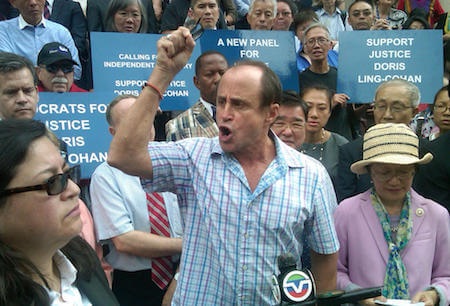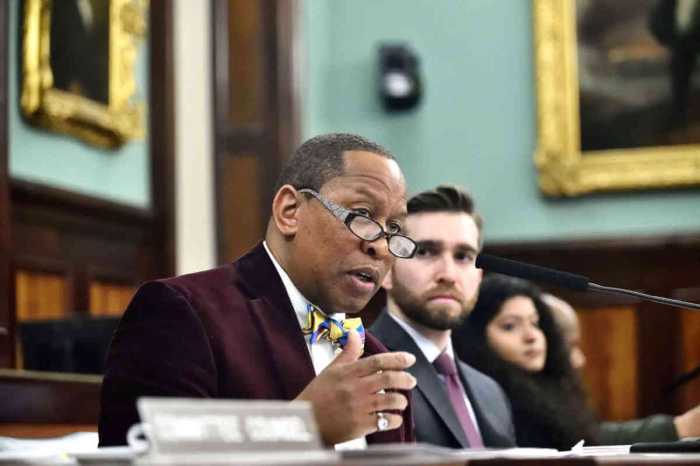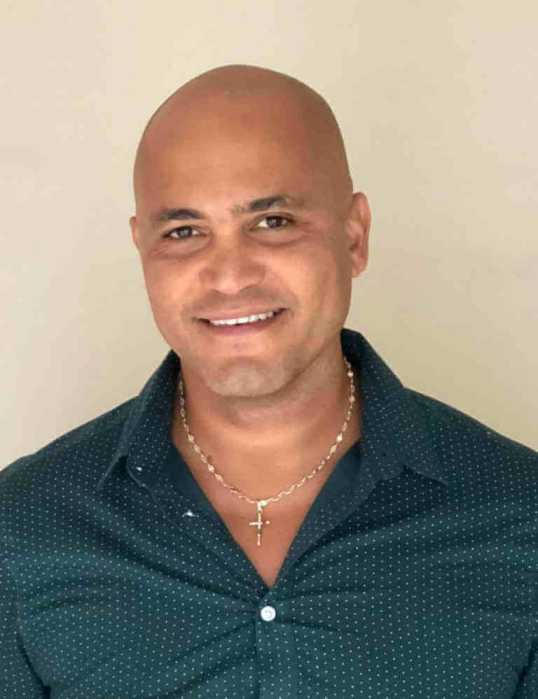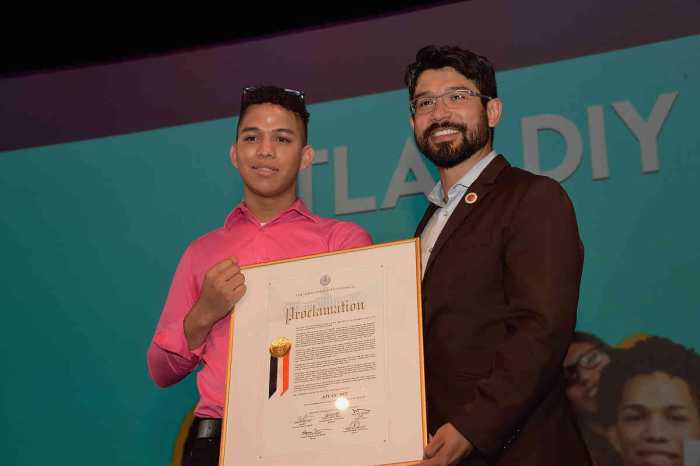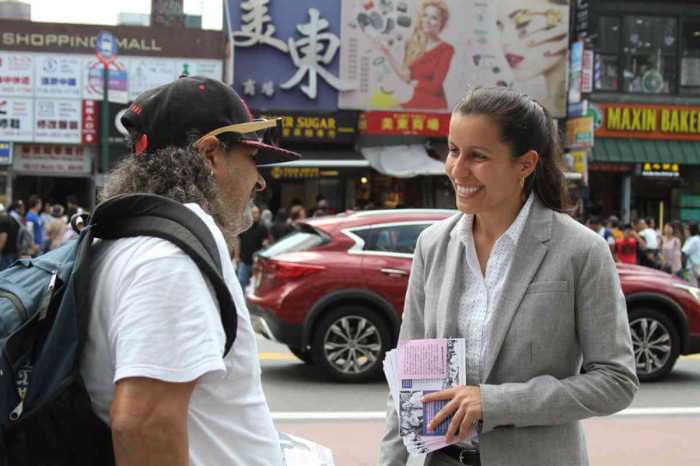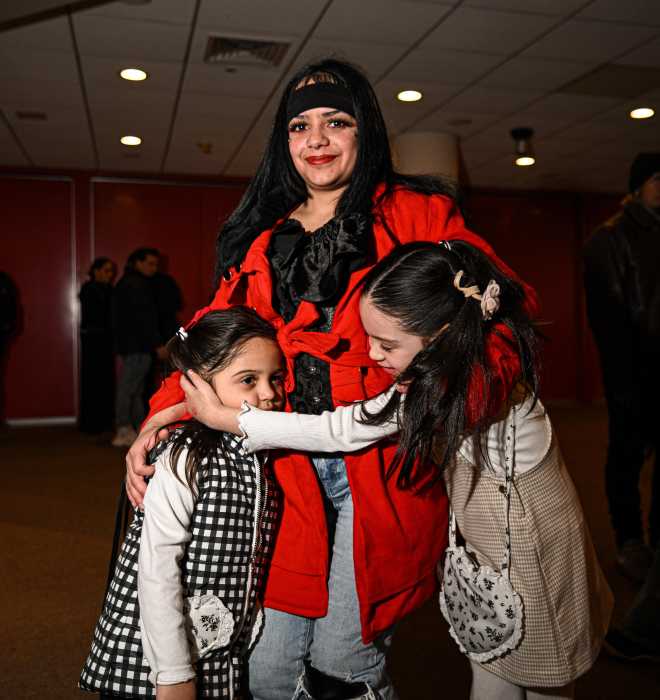City Councilmember Rosie Mendez, flanked by State Assemblymember Deborah Glick and Councilmember Margaret Chin, at Tuesday's rally protesting the Democratic Party's snub of Justice Doris Ling-Cohan. | GAY CITY NEWS
The New York County Democratic Party and its vaunted independent screening panel for approving judges for the ballot has come under scorching and widespread outrage for the panel’s refusal to recommend that Justice Doris Ling-Cohan, a 20-year veteran of the bench without a blemish on her record, be approved for nomination for re-election at the September 22 county convention.
That decision marks the first time that a sitting judge, in the absence of any formal complaints about her work, has not been recommended by the panel –– let alone a judge uniformly praised as “distinguished” by an array of civic and legal groups as well as by a host of elected officials.
In response, the party’s executive committee made up of district leaders is meeting in emergency session on Wednesday, September 7, at 6:30 p.m. at 45 West 14th Street, mezzanine level, to explore any legal way to nominate Ling-Cohan this year.
Historic ’05 marriage ruling’s author nixed by panel that critics charge real estate lawyers control
Curtis Arluck, the longtime co-chair of the party’s Judiciary Committee, said that the panel’s decision was “bizarre” and unprecedented. But he and Harlem State Assemblymember Keith Wright, the county leader, emphasized that there must be a “firewall” between the party and its screening panel. Both have said that panelists are free to speak to the press or in public now that their deliberations are over, but panelists have mostly refused comment since neither Arluck nor Wright has directly communicated that message to them, instead relying on the panel administrator to do so. If panelists report being misled or realize that rules were not followed properly, that could be grounds for revisiting the decision over Ling-Cohan.
Ling-Cohan is the author of the historic 2005 decision ordering the city to begin issuing marriage licenses to same-sex couples, a decision successfully appealed by Mayor Michael Bloomberg and Attorney General Eliot Spitzer, which delayed gay marriages in New York for six years until the Legislature acted in 2011. Her ruling that the exclusion of gay couples from marriage was unconstitutional was ultimately borne out by the US Supreme Court in the 2013 Windsor decision, which gutted the federal Defense of Marriage Act, and the 2015 Obergefell ruling, which overturned all state bans on same-sex marriage.
The rejection of Ling-Cohan, first revealed in a New York Post story last week that quoted an anonymous source with supposed knowledge of the confidential proceedings as saying the panel viewed her as “lazy,” has called into question the impartiality of some members of the screening panels — now predominately composed of lawyers who enjoy the opportunity to pick the judges they will appear before in cases involving millions of dollars.
“These white shoe lawyers are getting a chance to knock off judges to benefit themselves,” charged Pete Gleason of the Downtown Independent Democrats.
Allen Roskoff, president of the Jim Owles Liberal Democratic Club, along with City Councilmember Rosie Mendez, State Senator Brad Hoylman, and Councilmember Margaret Chin. | GAY CITY NEWS
Reliable sources say that Ling-Cohan was rejected by a 12-10 vote spearheaded by Deborah Riegel, a real estate lawyer whose firm would benefit if Ling-Cohan, who is widely supported by tenant groups, were not allowed to run again.
In response to a request for comment, Riegel, in an email message, wrote, “Notwithstanding what you may believe, the deliberations are confidential and I have no comment.”
A tenant lawyer who said he spoke to Riegel said that she told him, “The only one who is politicizing this process is Doris Ling-Cohan.”
The administrator responsible for guiding the panel’s process, Cyril K. Bedford, is also a real estate lawyer.
While the 39 groups invited to send panelists reflected racial, gender, and sexual orientation diversity –– though legal groups outnumbered community groups two to one –– just 22 sent panelists and the vast majority were attorneys, mostly from the real estate and corporate bars, with some civil rights and immigration attorneys and one lay person from the Fortune Society, an ex-offender group. There does not even appear to be a requirement that the panelists live in Manhattan on a body intended to represent the borough’s voters.
The objections to Ling-Cohan inside the panel were said to be related to an old small claims case from 14 years ago and her insistence that attorneys put their emergency motions in writing even if only handwritten so that a court record would exist — rather than just discussing such motions in chambers. There is no way of knowing exactly what was discussed until panelists speak out publicly.
Ling-Cohan won approval for nomination from the panel subcommittee that interviewed her, but was later given no opportunity to address the concerns raised about her by the full panel.
In a September 1 email to Arluck, obtained by Gay City News, Ling-Cohan chastised the Judiciary Committee co-chair for holding a meeting to accept the panel’s recommendations without allowing her to be heard.
“The committee voted against reconsideration for me, in a close vote,” she wrote. “The fact that there were… people with clear conflicts of interest at the meeting surely influenced the process and a revote should be taken.”
Ling-Cohan also advised Arluck that Chief Administrative Judge Lawrence K. Marks “is available to speak to anyone who wants to check my qualifications… If New York County wants to maintain its reputation as a bastion of judicial reform, your committee should, at a minimum, call him to do a due diligence review on me.”
Then turning to the Post story about the decision to block her nomination, Ling-Cohan wrote that the “confidentiality of the panel has been severely breached by insiders, including panel members… The fact that there were so many ‘sources’ speaking to the NY Post taints the whole process and clearly indicates that I was unfairly targeted, so that I request there be a new panel constituted.”
Emily Jane Goodman, a judge for 30 years and former colleague of Ling-Cohan’s who is now in private practice, said the panel’s failure to follow American Bar Association guidelines regarding sitting judges will have a “chilling effect,” with judges, already worried about media and political reactions to their rulings, now having to be concerned about being turned out by screening panel lawyers taking their jobs away because they don’t like their rulings.
“It is an absolute outrage,” Goodman said at a press conference September 6 at City Hall led by City Councilmembers Rosie Mendez and Margaret Chin, both of whom came armed with volumes of material and data attesting to Ling-Cohan’s competence, diligence, and probity –– including the fact that in 20 years she has heard more 10,000 cases and only been reversed on appeal 48 times (less than 0.5 percent). In 2015, the National Law Journal named Ling-Cohan one of the 75 Outstanding Women Lawyers in America.
The Office of Court Administration, which does not appear to have been consulted by the panel, indicated that Ling-Cohan’s “performance in timely resolving cases and motions before her has been well above the average among her colleagues.”
None of Ling-Cohan’s critics have come forward to speak on the record about their issues with her. But more than a 100 supporters rallied for her on Tuesday demanding that the party reverse itself.
Mendez, an out lesbian, has vowed to nominate Ling-Cohan from the floor at the county convention on September 22. While party rules forbid any executive committee member from nominating someone not reported out of the panel, there does not appear to be any bar to a floor nomination. Manhattan voters will elect delegates to the convention in the September 13 Democratic primary.
“Justice for the Justice,” the crowd chanted in support of Ling-Cohan at the rally.
Mendez emphasized that Ling-Cohan was the first Asian-American woman elected to the State Supreme Court and the first Asian American appointed to the Appellate Term.
“Her record speaks for itself,” Mendez said.
“She is an independent judge not beholden to anyone but the people,” Chin said.
CUNY law professor Joe Rosenberg called her “a role model for CUNY law students and law students throughout New York City.”
Also speaking or delivering messages of support for Ling-Cohan at the rally were the Korean American Lawyers Association, the LGBT Bar Association of Greater New York, the Asian American Bar Association of NY, the Jim Owles Liberal Democratic Club, the Puerto Rican Bar Association, and the Asian American Legal Defense and Education Fund.
Among those on hand to support Ling-Cohan were other out LGBT elected officials, including Council Majority Leader Jimmy Van Bramer, Councilmember Corey Johnson, State Senator Brad Hoylman, and Assemblymember Deborah Glick. Coumcilmembers Daniel Dromm and Carlos Menchaca, also gay, signaled their support for Ling-Cohan, as well.
Allen Roskoff, president of Jim Owles Club, said, “Doris Ling-Cohan cares about the people. That’s why the landlords don’t like her and the One Percent don’t like her.” He accused “party hacks” in the county organization of wanting her out to get their own candidates in.
Many executive committee members, in fact, have their own candidates, including Louise Dankberg, Arluck’s co-chair on the Judiciary Committee, who is supporting Nancy Bannon, who is up for consideration at the convention.
In an email message, John Fisher of TenantNet wrote, “Assemblymember Keith Wright, closely allied with [the Real Estate Board of New York]… is seen as allowing the judicial screening panel to knock Justice Ling-Cohan off the ballot. It would not be happening without his acquiescence or specific direction.”
To that charge, Wright responded, “Anyone that knows what they are talking about in the picking of judges knows that there is no foundation to that.”
Wright’s leadership and the independence of his party’s judicial panels are being put to their greatest test in the history of the county’s judicial nominating process. He and the Manhattan Democratic Party are faced with the daunting challenging of protecting the independence of their selection panels while doing justice to a long-serving jurist who has been maligned by panelists who will not defend or explain their decision.
Editor's note: This story as initially posted incorrectly stated that Justice Doris Ling-Cohan was the first Asian American elected to the State Supreme Court. In fact, Peter Tom was elected earlier. Ling-Cohan was the first Asian-American woman. The story also incorrectly reported that Bruce N. Lederman was a leader in the move to oust Ling-Cohan. In fact, he voted to approve her renomination. Gay City News regrets that error.

